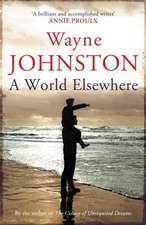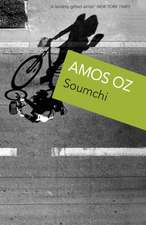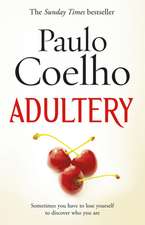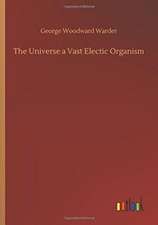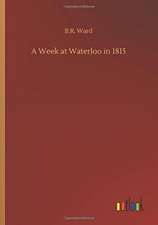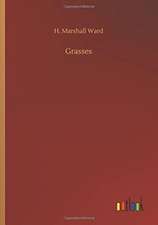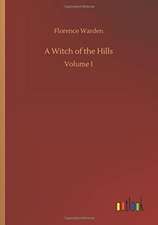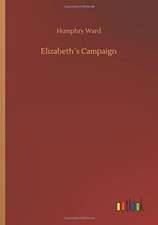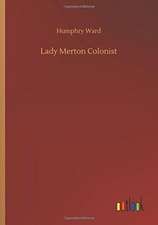The Navigator Of New York
Autor Wayne Johnstonen Limba Engleză Paperback – 6 aug 2003
| Toate formatele și edițiile | Preț | Express |
|---|---|---|
| Paperback (2) | 41.02 lei 25-31 zile | +19.80 lei 5-11 zile |
| Vintage Publishing – 6 aug 2003 | 41.02 lei 25-31 zile | +19.80 lei 5-11 zile |
| Anchor Books – 31 aug 2003 | 102.69 lei 22-36 zile |
Preț: 41.02 lei
Preț vechi: 46.61 lei
-12% Nou
Puncte Express: 62
Preț estimativ în valută:
7.85€ • 8.15$ • 6.56£
7.85€ • 8.15$ • 6.56£
Carte disponibilă
Livrare economică 27 februarie-05 martie
Livrare express 07-13 februarie pentru 29.79 lei
Preluare comenzi: 021 569.72.76
Specificații
ISBN-13: 9780099444893
ISBN-10: 0099444895
Pagini: 496
Dimensiuni: 131 x 195 x 34 mm
Greutate: 0.35 kg
Editura: Vintage Publishing
Locul publicării:United Kingdom
ISBN-10: 0099444895
Pagini: 496
Dimensiuni: 131 x 195 x 34 mm
Greutate: 0.35 kg
Editura: Vintage Publishing
Locul publicării:United Kingdom
Notă biografică
Wayne Johnston is the author of several novels, including The Colony of Unrequited Dreams and The Divine Ryans, and the memoir Baltimore’s Mansion. He was born and raised in Newfoundland and now lives in Toronto.
Extras
Chapter One
In 1881, Aunt Daphne said, not long after my first birthday, my father told the family that he had signed on with the Hopedale Mission, which was run by Moravians to improve the lives of Eskimos in Labrador. His plan, for the next six months, was to travel the coast of Labrador as an outport doctor. He said that no matter what, he would always be an Anglican. But it was his becoming a fool, not a Moravian, that most concerned his family.
In what little time they had before he was due to leave, they, my mother and the Steads, including Edward, tried to talk him out of it. They could not counter his reasons for going, for he gave none. He would not counter the reasons they gave for why he should stay, instead meeting their every argument with silence. It would be disgraceful, Mother Stead told him; him off most of the time like the men who worked the boats, except that they at least sent home for the upkeep of their families what little money they didn’t spend on booze. This was not how a man born into a family of standing, and married into one, should conduct himself. Sometimes, on the invitation of Mother Stead, a minister would come by and join them in dressing down my father. He endured it all in silence for a while, then excused himself and went upstairs to his study. It was as though he was already gone, already remote from us.
Perhaps the idea to become an explorer occurred to him only after he became an outport doctor. Or he might have met explorers or heard about some while travelling in Labrador. I’m not sure.
At any rate, he had been with the Hopedale Mission just over a year, was at home after his second six-month stint, when he answered an ad he saw in an American newspaper. Applying for the position of ship’s doctor on his first polar expedition, he wrote: “I have for several years now been pursuing an occupation that required arduous travel to remote places and long stretches of time away from home.” Several years, not one. He said that for would-be expeditionaries, such embellishments were commonplace.
He signed on with his first expedition in 1882. A ship from Boston bound for what he simply called “the North” put in at St. John’s to take him on.
First a missionary, now an explorer. And him with a wife and a two-year-old son, and a brother whose lifetime partner he had pledged to be. My aunt’s husband, my uncle Edward.
Father Stead had been a doctor, and it was his wish, which they obliged, that his two sons “share a shingle” with him. My father, older by a year, deferred his acceptance at Edinburgh so that he and Uncle Edward could enrol together. The brothers Stead came back the Doctors Stead in 1876. In St. John’s, Anglicans went to Anglican doctors, whose numbers swelled to nine after the return home of Edward and my father. On the family shingle were listed one-third of the Anglican doctors in the city. It read, “Dr. A. Stead, Dr. F. Stead and Dr. E. Stead, General Practitioners and Surgeons,” as if Stead was not a name, but the initials of some credential they had all earned, some society of physicians to which all of them had been admitted.
Three years after their graduation from Edinburgh, Father Stead died, but the shingle was not altered. Until his death, the two brothers had shared a waiting room, but afterwards my father moved into his father’s surgery, across the hall. From the door that had borne both brothers’ names, my father’s was removed. It was necessary to make only one small change to the green-frosted window of grandfather’s door: the intial A was removed and the initial F put in its place. F for Francis.
Even without Father Stead, the family practice thrived. When asked who their doctor was, people said “the Steads,” as if my father and Edward did everything in tandem: examinations, diagnoses, treatments. When they arrived at reception, new patients were not asked which of the brothers they wished to see -- nor, in most cases, did they arrive with their minds made up. Patients were assigned on an alternating basis. To swear by one of the brothers Stead was to swear by the other.
But with the departure of my grandfather, the Steads were no longer the Steads, and for a while the practice faltered. And no wonder, Edward said, what with one of them having gone off, apparently preferring first the company of Eskimos and Moravians to that of his own kind, and now the profession of nursemaid to a boatload of social misfits to that of doctor. If one of them would do that, what might the other do?
The family itself dropped a notch in the estimation of its peers. It was as if some latent flaw in the Stead character had shown itself at last. My father’s patients did not go across the hall to Edward. They went to other doctors. Some of Edward’s patients did likewise. He had no choice but to accept new ones from a lower social circle.
My father, in letters home, insisted that he would take up his practice again one day. He promised Edward he would pay him the rent that his premises would have fetched from another doctor, but he was unable to make good on the promise, having forsaken all income.
Rather than find another partner, rather than take down the family shingle and replace it with one that bore a stranger’s name, Edward left my father’s office, and everything in it, exactly as it was.
That door. The door of the doctor who was never in but which still bore his name. It must have seemed to his patients that Edward was caught up in some unreasonably protracted period of mourning for his absent brother whose effects he could not bear to rearrange, let alone part with. Every day that door, his brother’s name, the frosted dark green glass bearing all the letters his did except for one. He could not come or go and not be prompted by that door to think of Francis.
The expedition “to the North” he said, immeasurably improved the map of the world, adding to it three small, unpopulated islands.
Soon, my father’s life was measured out in expeditions. When he came back from one, it was weeks before he no longer had to ask what month or what day of the week it was. He would go to his office, turn upside down the stack of newspapers left there for him by Edward and read about what had happened in the world while he was absent from it. He searched out what had been written about the expeditions he had served on, the records they had set. As my father had yet to command an expedition, none of these records was attributed to him. Rarely, these records were some “first” or “farthest.” But most of them were records of endurance, feats made necessary by catastrophes, blunders, mishaps. Declaring a record was usually a way of putting the best face on failure. “First to winter north of latitude . . .” was a euphemism for “Polar party stranded for months after ship trapped in ice off Greenland.”
From the Hardcover edition.
In 1881, Aunt Daphne said, not long after my first birthday, my father told the family that he had signed on with the Hopedale Mission, which was run by Moravians to improve the lives of Eskimos in Labrador. His plan, for the next six months, was to travel the coast of Labrador as an outport doctor. He said that no matter what, he would always be an Anglican. But it was his becoming a fool, not a Moravian, that most concerned his family.
In what little time they had before he was due to leave, they, my mother and the Steads, including Edward, tried to talk him out of it. They could not counter his reasons for going, for he gave none. He would not counter the reasons they gave for why he should stay, instead meeting their every argument with silence. It would be disgraceful, Mother Stead told him; him off most of the time like the men who worked the boats, except that they at least sent home for the upkeep of their families what little money they didn’t spend on booze. This was not how a man born into a family of standing, and married into one, should conduct himself. Sometimes, on the invitation of Mother Stead, a minister would come by and join them in dressing down my father. He endured it all in silence for a while, then excused himself and went upstairs to his study. It was as though he was already gone, already remote from us.
Perhaps the idea to become an explorer occurred to him only after he became an outport doctor. Or he might have met explorers or heard about some while travelling in Labrador. I’m not sure.
At any rate, he had been with the Hopedale Mission just over a year, was at home after his second six-month stint, when he answered an ad he saw in an American newspaper. Applying for the position of ship’s doctor on his first polar expedition, he wrote: “I have for several years now been pursuing an occupation that required arduous travel to remote places and long stretches of time away from home.” Several years, not one. He said that for would-be expeditionaries, such embellishments were commonplace.
He signed on with his first expedition in 1882. A ship from Boston bound for what he simply called “the North” put in at St. John’s to take him on.
First a missionary, now an explorer. And him with a wife and a two-year-old son, and a brother whose lifetime partner he had pledged to be. My aunt’s husband, my uncle Edward.
Father Stead had been a doctor, and it was his wish, which they obliged, that his two sons “share a shingle” with him. My father, older by a year, deferred his acceptance at Edinburgh so that he and Uncle Edward could enrol together. The brothers Stead came back the Doctors Stead in 1876. In St. John’s, Anglicans went to Anglican doctors, whose numbers swelled to nine after the return home of Edward and my father. On the family shingle were listed one-third of the Anglican doctors in the city. It read, “Dr. A. Stead, Dr. F. Stead and Dr. E. Stead, General Practitioners and Surgeons,” as if Stead was not a name, but the initials of some credential they had all earned, some society of physicians to which all of them had been admitted.
Three years after their graduation from Edinburgh, Father Stead died, but the shingle was not altered. Until his death, the two brothers had shared a waiting room, but afterwards my father moved into his father’s surgery, across the hall. From the door that had borne both brothers’ names, my father’s was removed. It was necessary to make only one small change to the green-frosted window of grandfather’s door: the intial A was removed and the initial F put in its place. F for Francis.
Even without Father Stead, the family practice thrived. When asked who their doctor was, people said “the Steads,” as if my father and Edward did everything in tandem: examinations, diagnoses, treatments. When they arrived at reception, new patients were not asked which of the brothers they wished to see -- nor, in most cases, did they arrive with their minds made up. Patients were assigned on an alternating basis. To swear by one of the brothers Stead was to swear by the other.
But with the departure of my grandfather, the Steads were no longer the Steads, and for a while the practice faltered. And no wonder, Edward said, what with one of them having gone off, apparently preferring first the company of Eskimos and Moravians to that of his own kind, and now the profession of nursemaid to a boatload of social misfits to that of doctor. If one of them would do that, what might the other do?
The family itself dropped a notch in the estimation of its peers. It was as if some latent flaw in the Stead character had shown itself at last. My father’s patients did not go across the hall to Edward. They went to other doctors. Some of Edward’s patients did likewise. He had no choice but to accept new ones from a lower social circle.
My father, in letters home, insisted that he would take up his practice again one day. He promised Edward he would pay him the rent that his premises would have fetched from another doctor, but he was unable to make good on the promise, having forsaken all income.
Rather than find another partner, rather than take down the family shingle and replace it with one that bore a stranger’s name, Edward left my father’s office, and everything in it, exactly as it was.
That door. The door of the doctor who was never in but which still bore his name. It must have seemed to his patients that Edward was caught up in some unreasonably protracted period of mourning for his absent brother whose effects he could not bear to rearrange, let alone part with. Every day that door, his brother’s name, the frosted dark green glass bearing all the letters his did except for one. He could not come or go and not be prompted by that door to think of Francis.
The expedition “to the North” he said, immeasurably improved the map of the world, adding to it three small, unpopulated islands.
Soon, my father’s life was measured out in expeditions. When he came back from one, it was weeks before he no longer had to ask what month or what day of the week it was. He would go to his office, turn upside down the stack of newspapers left there for him by Edward and read about what had happened in the world while he was absent from it. He searched out what had been written about the expeditions he had served on, the records they had set. As my father had yet to command an expedition, none of these records was attributed to him. Rarely, these records were some “first” or “farthest.” But most of them were records of endurance, feats made necessary by catastrophes, blunders, mishaps. Declaring a record was usually a way of putting the best face on failure. “First to winter north of latitude . . .” was a euphemism for “Polar party stranded for months after ship trapped in ice off Greenland.”
From the Hardcover edition.
Recenzii
“An ambitious, stately, far-flung and sometimes sly account of back-stabbing polar exploration . . .enjoyably exotic” –The New York Times
“By the time he’s finished describing this remarkable adventure, Johnson has braved the coldest spot on earth but delivered us to a place of genuine warmth.”—Christian Science Monitor
“[Johnston] finds breathtaking poetry in the ice of the Arctic and rich drama in the politics of polar exploration.”-- New York Daily News
“A masterpiece . . . Johnston is a master plotter whose wise words sting and stab.”—Entertainment Weekly
“Beautiful, evocative . . . Johnston is an accomplished storyteller, with a gift for both description and character. . . . Arctic exploration, first love, and family secrets blend perfectly.” –Booklist
“A historical novel with a resonant significance for the present. . . . The detail in The Navigator of New York is exact and gripping. . . . It is good that people write novels like this: bold, fat, story and character-led, filled with traditional novelistic virtues.” –The Ottawa Citizen
“Generously stuffed with crisp writing, rich characterizations, and haunting descriptions of the harsh beauty of the Arctic. . . . Johnston is a great novelist in the making.” –Kirkus Reviews (starred)
“It is a great pleasure to see Johnston continue to work this fictional territory he has discovered and claimed, with much finer results than the claiming and discovery of physical landmarks by such ‘navigators’ as Cook and Peary.” –Toronto Star
“Johnston has written yet another historical novel worth faking the flu and staying in bed to read. . . . As Stead emerges a richer character at the end, so, too, will you.” –Chatelaine
“The thrill of polar exploration, the beauty and terror of glaciers, and the horror of the long Arctic nights are splendidly evoked. The secrets . . . are slowly revealed, adding intrigue and suspense.” –Library Journal
“A captivating narrative that delves into both the noble and the seedier aspects of the human need to discover and explore. . . . Johnston’s ability to illuminate historical settings and situations continues to grow with each book, and this powerful effort is his best to date.” –Publishers Weekly (starred)
“Johnston writes evocatively of 19th-century Victorian Newfoundland and bustling turn-of-the-century New York. . . . Spellbinding.” –Toronto Globe and Mail
“A daring, complex quest tale. . . . Love holds sway twice and death takes several surly bows while the stage is cleared for the poignant finale. And all the time, invisibly present, Wayne Johnston himself, the novel’s sprite, obsessed with obsession, with driven men, has so much fun you just have to join in.” –The Scotsman (Edinburgh)
“By the time he’s finished describing this remarkable adventure, Johnson has braved the coldest spot on earth but delivered us to a place of genuine warmth.”—Christian Science Monitor
“[Johnston] finds breathtaking poetry in the ice of the Arctic and rich drama in the politics of polar exploration.”-- New York Daily News
“A masterpiece . . . Johnston is a master plotter whose wise words sting and stab.”—Entertainment Weekly
“Beautiful, evocative . . . Johnston is an accomplished storyteller, with a gift for both description and character. . . . Arctic exploration, first love, and family secrets blend perfectly.” –Booklist
“A historical novel with a resonant significance for the present. . . . The detail in The Navigator of New York is exact and gripping. . . . It is good that people write novels like this: bold, fat, story and character-led, filled with traditional novelistic virtues.” –The Ottawa Citizen
“Generously stuffed with crisp writing, rich characterizations, and haunting descriptions of the harsh beauty of the Arctic. . . . Johnston is a great novelist in the making.” –Kirkus Reviews (starred)
“It is a great pleasure to see Johnston continue to work this fictional territory he has discovered and claimed, with much finer results than the claiming and discovery of physical landmarks by such ‘navigators’ as Cook and Peary.” –Toronto Star
“Johnston has written yet another historical novel worth faking the flu and staying in bed to read. . . . As Stead emerges a richer character at the end, so, too, will you.” –Chatelaine
“The thrill of polar exploration, the beauty and terror of glaciers, and the horror of the long Arctic nights are splendidly evoked. The secrets . . . are slowly revealed, adding intrigue and suspense.” –Library Journal
“A captivating narrative that delves into both the noble and the seedier aspects of the human need to discover and explore. . . . Johnston’s ability to illuminate historical settings and situations continues to grow with each book, and this powerful effort is his best to date.” –Publishers Weekly (starred)
“Johnston writes evocatively of 19th-century Victorian Newfoundland and bustling turn-of-the-century New York. . . . Spellbinding.” –Toronto Globe and Mail
“A daring, complex quest tale. . . . Love holds sway twice and death takes several surly bows while the stage is cleared for the poignant finale. And all the time, invisibly present, Wayne Johnston himself, the novel’s sprite, obsessed with obsession, with driven men, has so much fun you just have to join in.” –The Scotsman (Edinburgh)


